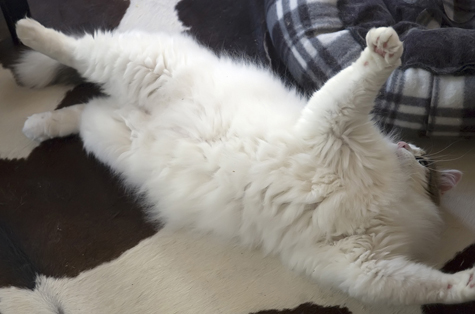Gwendolyn Bounds wrote an article earlier this week in the
Wall Street Journal decrying the epidemic of obesity in cats and dogs in the United States. While it's true this IS an epidemic of obese pets, how we got to this point with out companion animals is way off target.
She notes that pets are like their overweight parents, under-exercised and over fed. That the only solution is to do the same for people as we do for our pets-put them on a diet! Make them exercise! And yes, to solve this problem, some pet food manufacturers are jumping on the bandwagon and are now offing a "weight watchers" style feeding program for fat pets!
YOU'VE GOT TO BE KIDDING ME!
Considering the pet food industry is at fault for our pets soaring weight problem, the finger needs to be pointed at THEM, not the pet owners; especially in regards to cats.
Let's get a few things straight:
If you look at the history of pet food, when it started to be available at the turn of the last century, it was a way to make a profit off of the leftovers of other processes and most of them were related to the GRAIN industry. What to do with horse meat, rendered animal fat of who-knows-what animals? What to do with all this corn and corn by-products? Let's put them into pet food. Up until that time owners were feeding "table scraps" which was common to do and was actually much better for the pets health. Ads used to show that "including their pet food with table scraps would make a complete diet." They were just using it as a way to get folks to buy their junk, based on NO SCIENCE WHATSOEVER. It was based on making MONEY, pure and simple.
In the 1940's during WWII, the tin for cans had to go to the war effort, so manufacturers came up with dried food in bags. They began a marketing campaign saying that table scraps were BAD, might as well be poison, and the only really good food was their dry food. Again, not based on doing any studies of animal health.
It was simple to feed, easy to use, cheap. Again, always touting that this was the best, balanced food for your pet, made out of junk.
As time passed, families just followed the advertising promising their food was wholesome and showed pretty pictures of healthy looking cuts of meat and vegetables on their packaging-which couldn't be further from the truth. Proving their food isn't all it's cracked up to be, as recently as the 1980's manufacturers didn't even know to add taurine to a cat's diet or they would DIE. I wonder how many cats were fed this junk and died as a result?
Somewhere along the line, the truth of what a cat needs to thrive, got lost in hype. So what could have been based on science and creating a species appropriate diet got lost in making a buck. Who pays for this? We do! Our animals do by sickening and dying. Do some cats thrive on drive food? I doubt it. They will live, but in what condition?
The obesity epidemic is due to inappropriate pet food being sold. It's the same as if we went to McDonald's every day and loaded up on junk. We'd get fat, sick, and die. Put a cat on cheap kibble, full of grain and watch them get fat, sick and die. They won't get obese if we just feed them something based on what cats NEED, not advertising.
Cats are "obligate" carnivores. They NEED meat to survive. They cannot process grains. They have no teeth to crush dry food or crush grain. They bite, rip and swallow, they don't grind food. Their digestion is short, unlike humans. That's why they can't process grain effectively. They also lack the enzyme to digest it. SO WHY FEED IT TO THEM?

©2006 Robin A.F. Olson. My cat Spencer before I switched to grain-free, then a raw diet.
Cats get energy from PROTEIN, NOT CARBS! Cats cannot be put on a DIET! They can get Hepatic Lipidosis so you must be careful changing what they eat. Cats need MEAT, BONES, ORGANS...that's it.
You don't have to buy a treadmill for your dog or your cat or run them around the yard, you need to READ LABELS on what you buy. Don't fall for the seductive ads with pretty pictures.
I suggest the following:
1. Pick up the bowls of kibble and throw them out. NEVER BUY KIBBLE AGAIN. Even premium brands, though much less dreadful, are too processed. Cats lose nutrients they really need in the overcooking of protein. Do you see your cat wolf down their dry food? They're desperately trying to get the nutrition they desire, but aren't getting it. They will eat and eat and drink LOTS of water. Their litter pan will be overflowing with foul smelling bowels. You don't leave a bowl of food out all day. The cats can get two measured meals a day and be totally fine.
2. READ THE LABEL-At least buy canned cat food marked, GRAIN FREE. If you've done that, you've done a great kindness to your cat. The first ingredients should be a known protein source, not a by-product. The more protein, the better. The rest is common sense-get the best quality ingredients you can afford-and YES, it will cost more, but how much do vet trips cost with a sick cat or treating diabetes or cancer?
3. If you want to do the ultimate, feed a raw or (even lightly cooked if you must) diet to your cat. Their ultimate food is a live caught mouse, but I'm not asking you to do that. There are many pre-mixed, ready-to-go, brands of raw food or you can make it up yourself. If you need a recipe, email me and I'll send you one.
Your Vet may pitch a fit. He or she may say "The cat will get Salmonella and you will, too." VETS DO NOT GET MORE THAN A FEW HOURS OF NUTRITIONAL CLASSROOM TIME AT SCHOOL. You need to do the research and read about feline nutrition. While it would make sense that handling raw meat leads to illness, it's NOT the case for cats. Their digestion is too acidic and their digestion process is too fast to "brew" any decent salmonella. Safe handling of meat, hand washing keeps you safe, too. Wipe down the countertops and wash all utensils in hot water. COMMON SENSE. We have never gotten sick or sickened our cats.
So while it's true our cats and dogs are getting fatter by the minute, I hope you'll take a moment to think about what you feed your cat. Is it really appropriate for them or is it just keeping them alive and at the cost of them really THRIVING?
This epidemic is not the fault of the pet owners as much it is the pet food companies and their clever advertising. Please don't fall for it and do what YOU think makes the most sense. Your cats depend on you. Don't let them down.

©2008 Robin A.F. Olson. Spencer about a year or so after the switch. Nice belly, still, but appropriately sized!
--------------------------
Decide for yourself. Here are some helpful links:
If you'd like to read more about feeding a raw-fed diet, visit the Feline Nutrition Education
Society or read Dr. Pierson's web site.
--------------------------
Lastly, if you're feeding dry kibble to your cat, I'm not being critical of your choice. If you feel it's the thing you want to do, then you do that. I'm providing this information to all of you in the hopes you will begin to open your minds and be aware of what is going on in the pet food industry. They make lots of claims about balanced diets and find ways to make the nutrition info on the labels look good, but if you look deeper, you'll realize this stuff is really not appropriate for your cat and when you switch their diet, you will be AMAZED when you see your cat slim down to an appropriate weight, get a refined, silky coat, not load the litter pan with smelly poo and gain a sparkle in their eyes and renewed kitten-like energy. Give it a try and let me know how it goes.
Here's to your cat's good health!
UPDATE: Since I wrote this article, the misleading information about pet obesity was picked up by CNN. I wish someone would do their homework before announcing such nonsense. I really worry about the welfare of our companion animals.

Recent comments